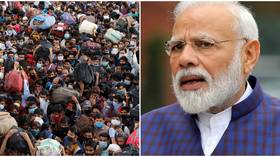India’s migrant exodus: Media and liberals attempt to use national crisis to destabilize Modi government amid lockdown

With India’s 1.3 billion people now on Covid-19 lockdown, the country faces another urgent crisis; the sudden exodus of inter-state migrants, now out of work, desperately fleeing the capital to reach their countryside villages.
Thousands of poor migrants were seen crowding a bus station in Delhi on Saturday, with little choice but to completely ignore the rules on maintaining ‘social distancing’ — one of the necessary steps taken across the world to ‘flatten the curve’ of the novel coronavirus outbreak. Similar scenes were witnessed in other provinces, too, as migrants attempted to make their way out of cities and back home.
Health risks
It seems this mass movement has been sparked mostly by fear. These migrants, already poor, have been left with no money in their pockets — and with work no longer readily available, it’s become even harder for them to feed themselves, let alone their families.
Controlling the flow of migrants is a serious challenge for both the centralized union government and the provinces, which have been forced to take more action to ensure adequate arrangements to provide food and shelter. The lockdown, which prompted their exodus in the first place, was enforced to curb the spread of a viral infection amid a global pandemic — and clearly, any mass movement of people travelling tightly together carries the risk of spreading the illness and bringing it back to their native villages.
Also on rt.com Lockdown India still appears to be staving off Covid-19 – but will it last?Like the cities, many of India’s rural regions are also densely populated, which makes social distancing a continued challenge when they arrive home. This may give rise to the worst-case scenario — community transmission of the virus within the villages, which could quickly spiral rapidly out of control.
It’s no secret that India’s rural healthcare systems are largely in poor condition — and if the virus does reach the villages, it will be a Herculean task for the country to contain the pandemic. Many are already taking steps to avoid that possibility. The Uttar Pradesh government has been in talks with 60,000 village panchayats to work out the logistics for a mandatory quarantine of returning migrants.
There is no doubt that this uncoordinated mass departure from the cities is a result of the failure of policymakers at both the centre and state levels, who somehow all failed to properly anticipate the consequences of a national lockdown.
Scoring political points
Yet, what we are seeing play out is a one-sided blame game by India’s left-leaning liberals and much of Western media, which want to place all responsibility for the disarray at the feet of Prime Minister Narendra Modi. These groups have tried their best to use the situation as an opportunity to destabilize the Modi government and blame him entirely for the fallout from the lockdown; whether that be the dangers posed by the mass gatherings or the treatment of migrants by police along the way. In their minds, it is all the fault of Modi alone.
Also on rt.com India & Pakistan convert trains into mobile Covid-19 hospitals (PHOTOS, VIDEOS)The reality is that the national lockdown was a harsh but necessary move — taken after many provincial governments, like Punjab and Rajasthan, had already announced their own lockdowns. Indeed, almost the entire country was experiencing either complete or partial lockdown before Modi’s announcement came. In that context, it is hardly justifiable to lay all the blame at Modi’s door when state governments are equally responsible for failing to properly prepare and assuage the fears of migrant workers.
It is true that many poor Indians are finding it increasingly difficult to buy essential daily food items and that police in many areas are using excessively harsh force at such a sensitive and critical time — yet that is the only story being told by India’s liberals and Western media. In many places, police are also helping the needy by distributing food. Vehicles are filled with fruits and vegetables and operating as grocery stores and ATMs are functioning properly.
But the positive stories get ignored, as liberal media choose to highlight only the chaos, cynically utilizing a crisis to damage Modi politically.
Also on rt.com WATCH: Migrant workers & their families forced to take open-air CHEMICAL BATH in Indian cityTime for a joint effort
While he has plenty of critics, it is undeniable that many policies implemented by Modi over the last six years of his rule may be crucial in helping India to fight this pandemic and ease the problems created by the mass exodus of migrants. For instance, his ‘Clean India’ program which has led to major advances in sanitation across the country and his 'Modicare' health insurance scheme for the poorest Indians place India in a better position to fight the epidemic than it might otherwise have been.
Of course, it remains to be seen whether the central and the state governments are able to utilize these policies to properly overcome what is going to be an enormous challenge.
Modi has appealed to Indians to maintain social distancing. He has apologized to the country for implementing the lockdown and explained its necessity. Provincial leaders, cutting across all political ideologies, are trying their best to overcome the current challenges. It is a time for national unity and a joint effort rather than political point-scoring.
Like this story? Share it with a friend!
The statements, views and opinions expressed in this column are solely those of the author and do not necessarily represent those of RT.














